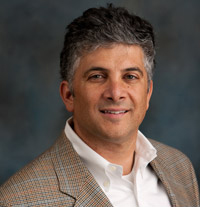 Few persons have had more influence in world history than Jesus of Nazareth. This course examines his life and teachings through a critical analysis of the ancient sources and modern scholarly reconstructions. The course will examine Jesus within the religious, social, and political context of the first century, and explore ways by which early Christians constructed their understanding of him. The course will also touch on modern depictions of Jesus in both art and scholarly analysis, and the legacy of Jesus's life and death for Jewish-Christian relations. We asked Gary Gilbert, Associate Professor of Religious Studies, about this unique class that he is teaching this summer.
CMC: Is this class particularly hard to teach since a large number of denominations within Christianity endorse different interpretations of the biblical text?
Gilbert: This is a non-denominational, non-confessional course. It assumes no prior knowledge of the gospel literature or the history of Christianity. Regardless of one's own personal beliefs or non-beliefs about Jesus, this is great opportunity to study in depth the life and teachings of one of the most significant persons in world history
CMC: When teaching this course in the past, have you had lots of heated debates among students?
Gilbert: When studying the life of Jesus' one quickly comes to the realization that the sources we have, both Christian and non-Christian material, are not entirely consistent. Some of the sources present different perspectives. Some of the sources actually contradict one another. As a result, students and I are constantly engaged in discussions and debates about what material is historically reliable and is appropriate for reconstructing Jesus' own teachings. Did Jesus really deliver a sermon on the mount? Why does Jesus refer to himself as the Son of Man? What factors led to Jesus crucifixion? What makes this class so fascinating is that most of the debates have no definitive answer. Rather, students must build and defend an argument based on the available material, recognizing both its strengthes and weaknesses.
CMC: What did your past students find most interesting about this class?
Gilbert: What I try to emphasize and what students tend to appreciate is what I call a holistic approach to learning. Students come to this class largely with an interest in knowing more about Jesus. What they soon realize, however, is that this course is really about how to read and analyze texts and how to make reasoned judgments about history and historical personalities, skills that are important for and immediately applicable to other courses and to experiences beyond CMC.
Few persons have had more influence in world history than Jesus of Nazareth. This course examines his life and teachings through a critical analysis of the ancient sources and modern scholarly reconstructions. The course will examine Jesus within the religious, social, and political context of the first century, and explore ways by which early Christians constructed their understanding of him. The course will also touch on modern depictions of Jesus in both art and scholarly analysis, and the legacy of Jesus's life and death for Jewish-Christian relations. We asked Gary Gilbert, Associate Professor of Religious Studies, about this unique class that he is teaching this summer.
CMC: Is this class particularly hard to teach since a large number of denominations within Christianity endorse different interpretations of the biblical text?
Gilbert: This is a non-denominational, non-confessional course. It assumes no prior knowledge of the gospel literature or the history of Christianity. Regardless of one's own personal beliefs or non-beliefs about Jesus, this is great opportunity to study in depth the life and teachings of one of the most significant persons in world history
CMC: When teaching this course in the past, have you had lots of heated debates among students?
Gilbert: When studying the life of Jesus' one quickly comes to the realization that the sources we have, both Christian and non-Christian material, are not entirely consistent. Some of the sources present different perspectives. Some of the sources actually contradict one another. As a result, students and I are constantly engaged in discussions and debates about what material is historically reliable and is appropriate for reconstructing Jesus' own teachings. Did Jesus really deliver a sermon on the mount? Why does Jesus refer to himself as the Son of Man? What factors led to Jesus crucifixion? What makes this class so fascinating is that most of the debates have no definitive answer. Rather, students must build and defend an argument based on the available material, recognizing both its strengthes and weaknesses.
CMC: What did your past students find most interesting about this class?
Gilbert: What I try to emphasize and what students tend to appreciate is what I call a holistic approach to learning. Students come to this class largely with an interest in knowing more about Jesus. What they soon realize, however, is that this course is really about how to read and analyze texts and how to make reasoned judgments about history and historical personalities, skills that are important for and immediately applicable to other courses and to experiences beyond CMC.
CMC: After taking this class, will students be well-versed in the history of the period? Gilbert: You cannot study the life of Jesus without understanding the world in which he lived. We spend considerable time reading Jewish and Roman literature, asking how might Jesus' words and deeds been heard and perceived in the first century, not only by Christians, but Jews and Romans as well. Jesus' language and teaching have not only religious significance, but also engaged important contemporary political and cultural issues. In addition to Jesus' life and beginnings of Christianity, students learn about Roman imperial administration, political rhetoric, and Jewish beliefs rituals, that informed Jesus' teachings about the Kingdom of God and other topics.
RLST 120: The Life of Jesus - 3-week intensive
May 21 - June 29, 2012
Professor Gary Gilbert
MTWRF 9:00 AM - 12:00 PM
